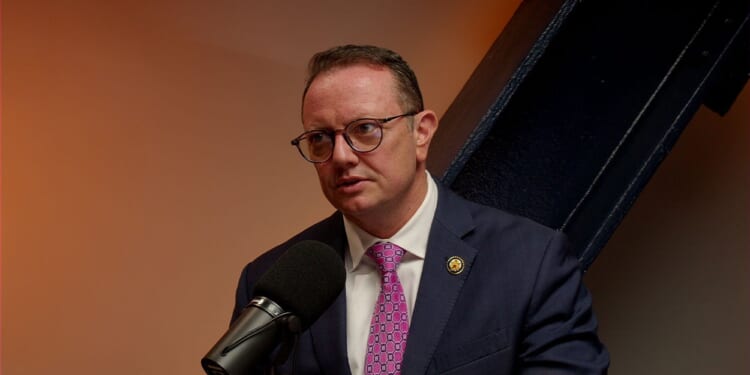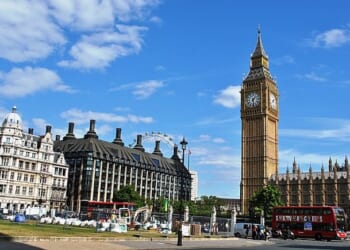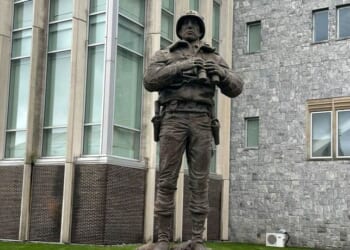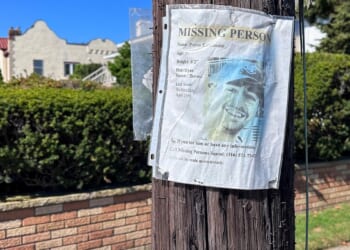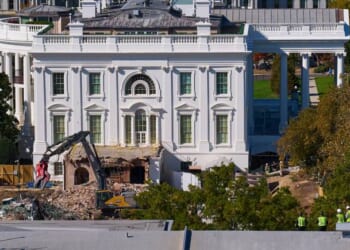The following is a preview of Daily Signal Politics Editor Bradley Devlin’s interview with Rep. Eric Burlison, R-Mo., on “The Signal Sitdown.” The full interview premieres on The Daily Signal’s YouTube page at 6:30 a.m. Eastern on Nov. 20.
After months of drawn-out fighting over the release of the Epstein Files, a bill that would order the release of all unclassified information about disgraced financier and sexual predator Jeffrey Epstein is heading to the Resolute Desk.
But, while the congressional drama is coming to a close, a new chapter in the Epstein story could just be opening. What could more tranches of Epstein documents reveal, and what questions remain about Epstein’s activities and elite network? As a member of the House Oversight Committee, Rep. Eric Burlison, R-Mo., has been deeply involved in the ongoing Congressional investigation into Epstein. He joins “The Signal Sitdown” to discuss what comes next in the fight for the release of the Epstein files.
“I’ve consistently said the victims deserved to have justice. Imagine you were raped as a young girl and your government is hiding and protecting the people that were complicit or involved in that act,” Burlison told The Daily Signal. “The very government you’re paying your tax dollars to, the one entity, law enforcement, that is supposed to be there to save you, to protect you, is the one that’s turning on you. I think that the disservice to the victims was, to me, gut wrenching.”
On Tuesday, the House and Senate voted on The Epstein Files Transparency Act. The House passed the bill by a vote of 427-to-1 before the Senate later approved it by unanimous consent later that afternoon. Previously, a procedural mechanism called a discharge petition garnered the 218 signatures necessary to force a vote on the House floor.
The Epstein Files Transparency Act “requires the Department of Justice to release what files that they have, barring any kind of information that would further expose any victims or any kind of child pornography, any of that kind of material,” Burlison said of the legislation.
President Donald Trump has said he will sign the legislation after a last minute flip, encouraging Republicans in Congress to sign what he had called a “hoax.”
But the discharge petition is no panacea to the Epstein debacle, Burlison pointed out. While it has been driving the headlines regarding the Epstein case, there are other aspects that the discharge petition does not touch, which means the House Oversight Committee’s continued work on the files remains essential.
”In Oversight, we’ve actually got more documents than I think this discharge petition will get,” Burlison said of the committee’s work.
The oversight committee has already released more than 60,000 documents relating to Epstein over a series of tranches, according to Burlison.
“There’s quite a bit of overlap between the discharge petition and what we’ve subpoenaed in Oversight,” Burlison explained. But, “where the discharge petition falls short is that we’re not getting, in the discharge petition, the depositions of all these people. So, bringing in people like the Clintons, bringing in all of these individuals—even prosecutors who have failed their job—bringing them in, getting them on record, that is an important part of this investigation, and that’s something that only the oversight committee has done,” he added.
Furthermore, the House Oversight Committee’s investigation has crucial information that will likely not be included in the discharge petition. “In addition, the Oversight Committee, in our subpoenas, we subpoenaed Jeffrey Epstein’s estate. From the estate is where we get the travel logs, we get his calendar—all of that information is extremely important,” but not in the bill heading to the president’s desk, Burlison said.
“Now, what the discharge petition did, that oversight has not subpoenaed yet, is some of the FBI files,” Burlison added. “Those files where the FBI was taking notes and from their interviews with people. That will be substantively the difference in passing the discharge petition.”
A cause for concern, however, is that the discharge petition only requires the release of unclassified information. Given Epstein’s alleged connections to intelligence operations, many in Washington believe a declassification effort could be necessary to know the whole truth.
The idea that Epstein is connected to intelligence “is a very plausible explanation,” Burlison said. “This town has kind of pulled together all these connections and that’s what you’re hearing through, through the rumor mill. And I’m not talking about just from politicians. I mean, from like people in the intelligence community.”
“When the FBI files are released, if there are connections made that would point in a direction for us to do an effort to declassify,” then Burlison wants to keep that option on the table.

